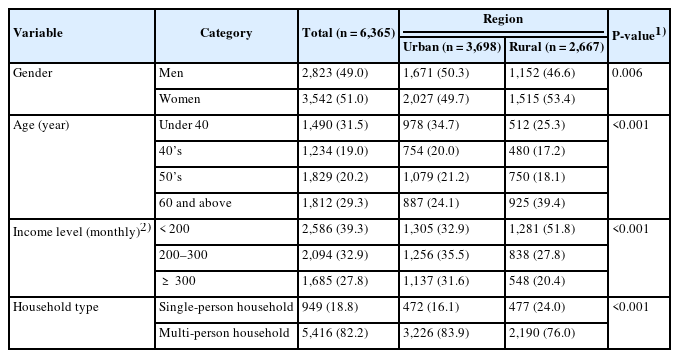Search
- Page Path
- HOME > Search
Research Article
- [Korean]
- A study on regional differences in dietary behaviors and satisfaction in Korea focusing on urban and rural comparisons: a cross-sectional study
- Jong-Youn Rha, Sohyun Kim, Hae-Rang Lee, Juhyeon Kil
- Korean J Community Nutr 2025;30(2):140-149. Published online April 29, 2025
- DOI: https://doi.org/10.5720/kjcn.2024.00262

-
 Abstract
Abstract
 PDF
PDF PubReader
PubReader ePub
ePub - Objectives
This study aims to examine regional differences in dietary behavior and satisfaction between urban and rural residents in Korea, identifying key factors associated with dietary satisfaction in each group to deepen understanding of these variations.
Methods
The data were obtained from the Consumer Behavior Survey for Food 2022 by the Korea Rural Economic Institute. The analysis involved 6,365 adult participants, using the complex survey χ2-test and complex survey t-tests to compare dietary behavior across regions and complex survey regression analysis to explore factors related to dietary satisfaction. Data were analyzed with R 4.3.1 (for macOS; Posit PBC).
Results
Urban and rural areas differed in consumer characteristics such as gender, age, income, and household type, as well as in food consumption behaviors and in dietary competencies associated with purchasing and intake. Specifically, dining out and processed food consumption were more prevalent in urban areas, whereas home-cooked meals were more frequent in rural areas. Overall, dietary competencies were higher among urban residents. However, there was no significant difference in dietary satisfaction between the two regions. This finding suggests that satisfaction is based on subjective evaluations, with consumers in each region forming satisfaction in ways that align with their environment and lifestyle. Accordingly, the factors contributing to dietary satisfaction differed by region. In urban areas, information utilization competency and maintaining a balanced diet played a significant role in dietary satisfaction, whereas in rural areas, regular mealtimes were more influential. Urban consumers reported higher dietary satisfaction when meals provided a sense of appropriate convenience, whereas rural consumers showed greater satisfaction when meals were shared with family at home.
Conclusion
The findings indicate regional differences in food consumption behaviors and dietary competencies, as well as variations in how consumers achieve dietary satisfaction. These insights provide a foundation for developing dietary policies and programs aimed at improving dietary satisfaction.
- 1,025 View
- 44 Download


 KSCN
KSCN
 First
First Prev
Prev



